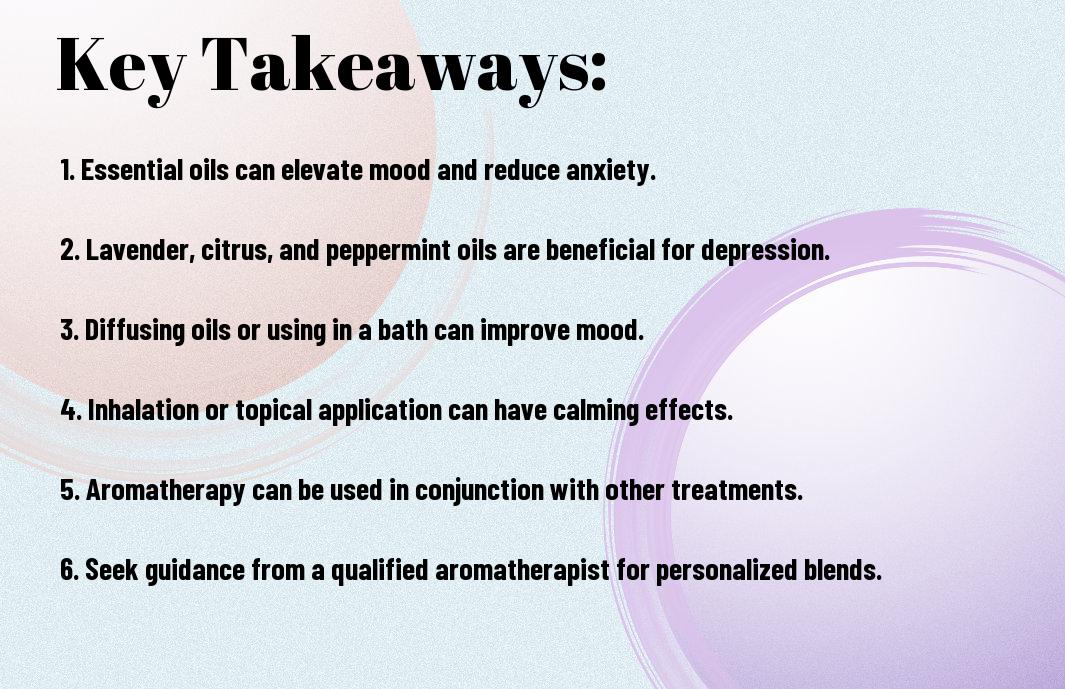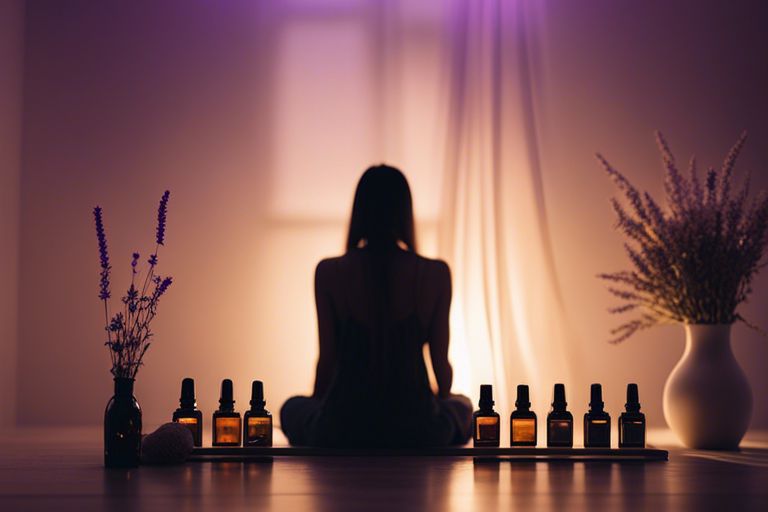Overcoming the grip of depression can be a challenging journey, but aromatherapy offers a gentle, natural way to find relief. In this post, we will explore how vital oils can uplift your mood, calm your mind, and bring balance to your emotions. Discover the powerful scents that can support your mental well-being and learn how to incorporate them into your daily routine. Let’s commence on a healing journey together with the magic of aromatherapy.
Key Takeaways:
- Aromatherapy can help alleviate symptoms of depression: Using imperative oils in aromatherapy can promote relaxation, uplift mood, and reduce feelings of sadness and anxiety.
- Certain imperative oils are recommended for depression: Oils like lavender, bergamot, chamomile, and ylang-ylang are known for their calming and mood-boosting properties, making them beneficial for individuals struggling with depression.
- Customize your aromatherapy blend: Experiment with different imperative oils or blends to find what works best for you. Personal preferences and responses to scents can vary, so it’s important to find the combination that resonates most with you.
The Power of Aromatherapy
Before we probe the secrets of aromatherapy for depression, it’s important to understand the power of aromatherapy in promoting overall well-being. Aromatherapy has been used for centuries as a natural healing practice that harnesses the therapeutic properties of important oils extracted from plants. These oils are known for their powerful abilities to positively affect our physical, emotional, and mental health.
How Essential Oils Work
Any discussion about aromatherapy must touch on how important oils work within the body and mind. When inhaled or applied to the skin, important oils travel through the bloodstream and can have a profound impact on the limbic system, the area of the brain responsible for emotions and memories. This direct pathway allows important oils to influence our mood, reduce stress, and promote relaxation.
The Science Behind Aromatherapy
Power your day with the knowledge of the science behind aromatherapy. Research has shown that important oils contain compounds that can positively impact neurotransmitters like serotonin and dopamine, which play a crucial role in regulating mood. Additionally, the aroma of important oils can stimulate the olfactory system, triggering the release of endorphins, the body’s natural feel-good chemicals.
Work with important oils to unlock their full potential in supporting your emotional well-being. By incorporating aromatherapy into your self-care routine, you can experience the benefits of improved mood, reduced anxiety, and enhanced relaxation. Take a step towards holistic healing by embracing the power of aromatherapy in your journey towards overcoming depression.
Identifying Depression Triggers
The first step in managing depression is to identify the triggers that contribute to your feelings of sadness and hopelessness. By understanding what causes or exacerbates your depression, you can develop strategies to cope more effectively and improve your overall well-being.
Common Causes of Depression
Depression can be influenced by a variety of factors, including biological, environmental, and psychological elements. Common causes of depression may include genetics, hormone imbalances, chronic stress, traumatic life events, and certain medical conditions. It’s vital to recognize that depression is a complex and multifaceted condition that requires a personalized approach to treatment.
Recognizing Your Emotional Patterns
To gain insight into your depression triggers, it’s important to pay attention to your emotional patterns and how they impact your mood. Keep a journal to track your emotions, thoughts, and behaviors. Notice any recurring patterns or situations that seem to trigger feelings of sadness or despair. Understanding your emotional triggers can help you develop healthier coping mechanisms and make positive changes in your life.
Recognizing your emotional patterns is a powerful tool in managing depression. By becoming more aware of the factors that contribute to your feelings of depression, you can take proactive steps to address them and improve your mental health. Be mindful of, you have the ability to overcome depression and create a life filled with joy and fulfillment.
Essential Oils for Mood Upliftment
All around us are powerful tools from nature that can help lift our spirits and ease the burden of depression. Essential oils have long been known for their ability to positively impact our mood and emotions. Here, we will explore some of the best crucial oils for upliftment and emotional balance.
Uplifting Citrus Oils (Bergamot, Lemon, Grapefruit)
The bright and invigorating scents of citrus oils like Bergamot, Lemon, and Grapefruit can work wonders in uplifting your mood. Bergamot is particularly known for its calming and balancing properties, making it a great choice for when you’re feeling anxious or down. Lemon and Grapefruit are energizing and refreshing, perfect for boosting your spirits on a gloomy day.
Calming Floral Oils (Lavender, Rose, Ylang-Ylang)
The gentle floral aromas of Lavender, Rose, and Ylang-Ylang can provide a sense of calm and tranquility during times of emotional distress. Lavender is renowned for its soothing properties and is often used to promote relaxation and relieve stress. Rose crucial oil is a symbol of love and beauty, evoking feelings of comfort and emotional healing. Ylang-Ylang is exotic and floral, known for its ability to uplift the spirit and promote feelings of joy and positivity.
Ylang-Ylang crucial oil is particularly helpful in releasing emotional blockages and fostering a sense of self-love and acceptance.
Grounding Earthy Oils (Patchouli, Cedarwood, Sandalwood)
The deep and rich aromas of earthy oils like Patchouli, Cedarwood, and Sandalwood can help anchor you to the present moment and provide a sense of stability and grounding. Patchouli is known for its calming and grounding effects, making it a great choice for promoting feelings of peace and relaxation. Cedarwood has a warm and woody scent that can help evoke a sense of security and inner strength. Sandalwood is often used in meditation and spiritual practices to enhance focus and promote emotional balance.
Ylang-Ylang crucial oil can help connect you to your inner self and promote a sense of peace and harmony.
Rose
Rose crucial oil is a symbol of love and beauty, known for its ability to nurture the heart and uplift the spirit. Its sweet and floral aroma can help heal emotional wounds and promote self-love and compassion.
Blending for Emotional Balance
Many people turn to aromatherapy as a natural way to support emotional well-being, especially when dealing with conditions like depression. Essential oils can play a significant role in promoting emotional balance and uplifting the spirits. By blending different oils, you can create custom combinations that cater to your specific needs and preferences.
Creating Custom Blends for Depression
Depression can be a challenging condition to navigate, but aromatherapy offers a glimmer of hope with its mood-boosting properties. When creating custom blends for depression, consider combining lavender for its calming effects, bergamot for its uplifting qualities, and frankincense for its grounding properties. Experiment with different ratios of these oils to find a blend that resonates with you and helps alleviate symptoms of depression.
Tips for Blending Essential Oils
Creating the perfect blend of crucial oils requires some knowledge and experimentation. Here are some tips to keep in mind when blending oils for emotional balance:
- Start with a base oil like jojoba or almond to dilute the crucial oils.
- Use a maximum of 3-5 different oils to avoid overpowering scents.
- Be mindful of any allergies or skin sensitivities when selecting oils for your blend.
Perceiving the subtle nuances of each crucial oil and how they interact with one another is key to creating a harmonious blend that promotes emotional well-being.
Aromatherapy Techniques for Depression
Despite the challenges of depression, aromatherapy offers powerful techniques to uplift the spirit and provide relief.
Diffusing Essential Oils
Aromatherapy diffusers are an excellent way to spread the healing scents of crucial oils throughout your living space. By diffusing crucial oils like lavender, bergamot, or ylang-ylang, you can create a calming and uplifting atmosphere that can help combat feelings of sadness and despair.
Topical Application Methods
With topical application methods, crucial oils can be diluted in carrier oils like coconut or almond oil and applied directly to the skin. This allows for direct absorption of the oils into the bloodstream, providing quick relief and benefits for mental well-being.
Topical application is a great way to target specific areas of the body that may be experiencing tension or stress. Massaging crucial oils into pulse points, such as the wrists or temples, can promote relaxation and a sense of peace.
Inhalation Therapy
Inhalation therapy involves inhaling the aromatic vapors of crucial oils to promote emotional balance and mental clarity. This can be done by adding a few drops of crucial oils to a bowl of hot water or a steam inhaler to create a calming and grounding atmosphere that helps alleviate symptoms of depression.
One benefit of inhalation therapy is that it can be done on the go, providing instant relief in moments of distress or low mood. The uplifting scents of crucial oils like citrus or peppermint can help boost mood and energy levels throughout the day.
Combining Aromatherapy with Other Therapies
Once again, combining aromatherapy with other therapies can enhance the overall effectiveness in managing depression. From mindfulness and meditation to yoga and breathwork, integrating these practices can create a holistic approach to healing the mind, body, and spirit.
Mindfulness and Meditation
One powerful way to complement aromatherapy is by incorporating mindfulness and meditation into your daily routine. Mindfulness involves being fully present in the moment, which can help redirect negative thought patterns and promote mental clarity. Meditation, on the other hand, allows you to cultivate a sense of inner peace and calm, which can be especially beneficial for individuals struggling with depression.
Yoga and Breathwork
Meditation
The practice of yoga and breathwork can also be incredibly beneficial when used in conjunction with aromatherapy. Yoga combines physical postures with breath control and meditation, promoting relaxation and reducing stress levels. Breathwork techniques can help regulate emotions and increase feelings of well-being, making them a valuable addition to your depression management toolkit.
Journaling and Reflection
Therapies
The act of journaling and self-reflection can further complement the benefits of aromatherapy in managing depression. Journaling allows you to express your thoughts and emotions freely, providing insight into your mental state and helping you identify triggers for depressive episodes. Reflection on your journal entries can lead to greater self-awareness and personal growth, assisting you in developing healthier coping mechanisms.
This integrated approach to healing can empower you to take control of your mental health and develop a deeper understanding of yourself. By combining aromatherapy with mindfulness, meditation, yoga, breathwork, journaling, and reflection, you can create a comprehensive self-care routine that supports your journey towards emotional well-being.

To wrap up
Hence, incorporating aromatherapy into your daily routine can be a soothing and effective way to help manage the symptoms of depression. By utilizing vital oils like lavender, bergamot, or chamomile, you can create a calming environment that promotes relaxation and emotional well-being. Remember to always choose high-quality oils and consult with a healthcare professional if you have any concerns or pre-existing conditions.
FAQ
Q: How can aromatherapy help with depression?
A: Aromatherapy can help with depression by using necessary oils to stimulate the limbic system in the brain, which is responsible for emotions and memories. Certain scents can promote feelings of calmness, relaxation, and upliftment, which can help alleviate symptoms of depression.
Q: Which necessary oils are best for treating depression through aromatherapy?
A: Some of the best necessary oils for treating depression include lavender, bergamot, chamomile, and ylang-ylang. These oils have calming and uplifting properties that can help improve mood and promote emotional well-being.
Q: How can I use aromatherapy for depression at home?
A: You can use aromatherapy for depression at home by diffusing necessary oils in a diffuser, adding a few drops to a warm bath, creating a calming room spray, or applying diluted oils to pulse points. Remember to always use high-quality necessary oils and seek advice from a qualified aromatherapist if needed.

